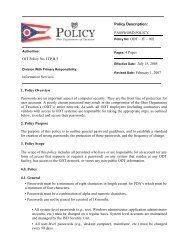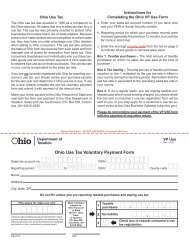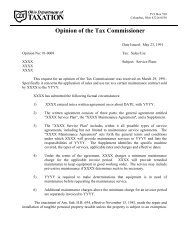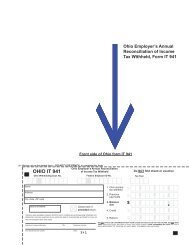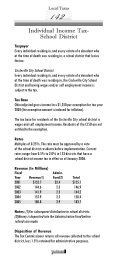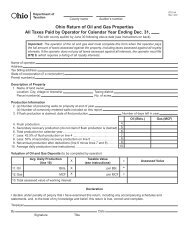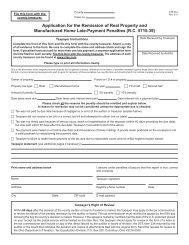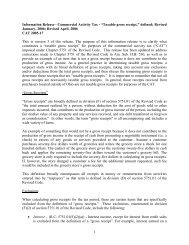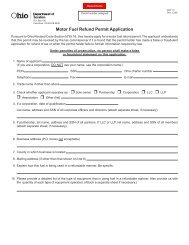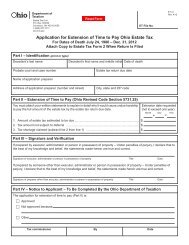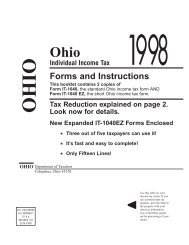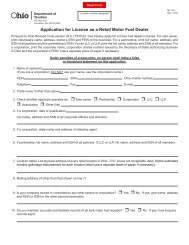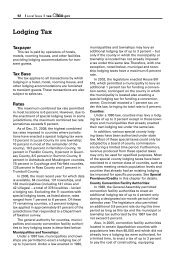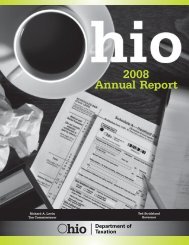The Small Business Workshop - Ohio Department of Taxation - State ...
The Small Business Workshop - Ohio Department of Taxation - State ...
The Small Business Workshop - Ohio Department of Taxation - State ...
You also want an ePaper? Increase the reach of your titles
YUMPU automatically turns print PDFs into web optimized ePapers that Google loves.
What if I Am Assessed for Unpaid Taxes?<br />
An assessment is a formal bill from the state <strong>of</strong> <strong>Ohio</strong> for taxes underpaid or not paid, interest and penalties.<br />
Assessments are delivered by certifi ed mail or personally by agents <strong>of</strong> the tax commissioner. At the time the<br />
assessment is delivered, or before that time, the department must provide the taxpayer a written description<br />
<strong>of</strong> why the assessment was issued and any penalties that may be imposed with the assessment. You must<br />
either pay or appeal the assessment to the tax commissioner within 60 days <strong>of</strong> the day that it is delivered.<br />
Complete instructions for fi ling an appeal will be with the assessment.<br />
If you appeal the assessment, the tax commissioner will conduct an administrative review <strong>of</strong> your claim and<br />
issue a fi nal determination. You have the right to appeal this decision to the Board <strong>of</strong> Tax Appeals (BTA).<br />
<strong>The</strong> BTA is like a court and will review the facts and interpret the law. It is independent <strong>of</strong> the tax commissioner<br />
and may modify or reverse decisions <strong>of</strong> the commissioner.<br />
What Records Must I Keep and for How Long?<br />
Each vendor must maintain complete, accurate records, which include both:<br />
Primary records such as purchase invoices, bills <strong>of</strong> lading, sales invoices, guest checks, exemption<br />
certifi cates, tax-payment receipts and cash-register tapes;<br />
Secondary records such as bank-deposit receipts and day books, journals or any other records in which<br />
accumulated data is recorded.<br />
Primary and secondary records must be maintained for at least four years with the exception <strong>of</strong> foodservice<br />
operators.<br />
A record <strong>of</strong> exempt sales must be maintained. Properly completed certifi cates <strong>of</strong> exemption must support<br />
exempt sales. Certifi cates must be maintained indefi nitely. Certifi cates may need to be updated<br />
periodically based on law changes. It is suggested that these certifi cates be fi led alphabetically for easier<br />
reference.<br />
Food-service operators who have not been convicted <strong>of</strong> a criminal violation are permitted the option <strong>of</strong><br />
keeping 14 days <strong>of</strong> sales records per calendar quarter in lieu <strong>of</strong> records <strong>of</strong> all sales from their food-service<br />
operation. If a food-service operator elects not to retain the records <strong>of</strong> all their sales, the records <strong>of</strong> sales<br />
made on 14 days out <strong>of</strong> each quarter as specifi ed by the tax commissioner after the quarter is over are<br />
required to be kept for the four-year statutory period.<br />
Although not required by law, the following records could be maintained to help you in fi ling sales and use<br />
tax returns, or whenever you may have to contact the department for assistance:<br />
1. A record <strong>of</strong> your sales and sales tax collected in separate columns in a record book or journal.<br />
2. A copy <strong>of</strong> each sales tax return and check you submit. Remember to write your sales or use-tax account<br />
number and period(s) for which payment is being made on every check. Also, indicate on<br />
the copy the date that you mailed the payment and/or electronically fi led the return.<br />
How Do I File My Sales Tax Return?<br />
Beginning with the fi rst fi ling period in 2009, all sales tax vendors are required to fi le electronically rather<br />
than on paper.<br />
<strong>The</strong> <strong>Ohio</strong> <strong>Department</strong> <strong>of</strong> <strong>Taxation</strong> <strong>of</strong>fers two ways to fi le a sales tax return electronically.<br />
<strong>Ohio</strong> <strong>Business</strong> Gateway<br />
Electronic fi ling is available for all sales tax vendors through the <strong>Ohio</strong> <strong>Business</strong> Gateway. <strong>The</strong> <strong>Ohio</strong> <strong>Business</strong><br />
Gateway is a Web site that enables vendors to electronically fi le returns with several <strong>Ohio</strong> agencies.<br />
You must register at obg.ohio.gov to use the online system. Payment may be made by check, ACH debit<br />
or by credit card. If you are a new vendor, you will not be able to use the <strong>Ohio</strong> <strong>Business</strong> Gateway until the<br />
<strong>Department</strong> <strong>of</strong> <strong>Taxation</strong> completes the processing <strong>of</strong> your license application. A confi rmation notice will be<br />
mailed to you once this process is complete. You may then register to use the <strong>Ohio</strong> <strong>Business</strong> Gateway.<br />
- 3 -



